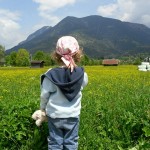Sensitizing political actors to the peculiarities of mountain regions
Interact Pro Monte (Pilot Project for Mountain Sustainable Development – The mountain regions in Europe) project had the following objectives:
 strengthen national and European regional policies for sustainable development of mountain areas
strengthen national and European regional policies for sustainable development of mountain areas - to undertake an analysis of cooperative projects implemented in mountain areas during the period 2003-2005
- diffusion and transfer of good practice between actors involved in INTERREG projects in mountain areas
Pro Monte was part of the European INTERACT program which aimed to analyze the operation and the results obtained by the various European Interreg programs.
Interact Pro Monte was developed during the period: 01.06.2004 – 31.05.2006
The project partners were: AEM (France) IREALP (Italy), Euromontana (France) ADECOHD (France), The General Council of Savoie (France), the Autonomous Province of Trento (Italy), the Province of Belluno (Italy ), Province Granada (Spain), Zdanie (Poland), Lasithi Prefecture (Greece), the municipality of Itamos (Greece).
Implementation and results
- In a first stage of the project an assessment of best practices for cross-border, transnational and interregional cooperation in mountain areas has been made. This information was analyzed and adapted to the expectations of the authorities and local actors.
- During a second step, the transfer of good practices and their dissemination was made among the project partners but also with other state, regional and local actors in mountain regions.
 Euromontana role in the project was to conduct interviews with a variety of mountain actors across Europe, then to develop a database and interactive computing platform with stakeholders and potentially affected by the results the project. In addition, Euromontana was responsible for the dissemination of the project and the organisation of various conferences and seminars of the project.
Euromontana role in the project was to conduct interviews with a variety of mountain actors across Europe, then to develop a database and interactive computing platform with stakeholders and potentially affected by the results the project. In addition, Euromontana was responsible for the dissemination of the project and the organisation of various conferences and seminars of the project.
One of the conclusions of the analysis is that projects in different regions, problems of mountain regions were not taken into account. By cons, indirectly (by the geographical boundaries of the “Alpine Space” program, for example), we can say Interreg key mountain areas in a sustainable manner.
You will find the analysis of the various programmes in a report report and in a summary table.
To contribute to the improvement of European regional development policies and programs of regional cooperation, the partnership has also developed a list of recommandations and conclusions. These highlight the need to promote the consideration of matters specific to mountain areas in future programs of cross-border cooperation. This list also contains project ideas for mountain regions.










